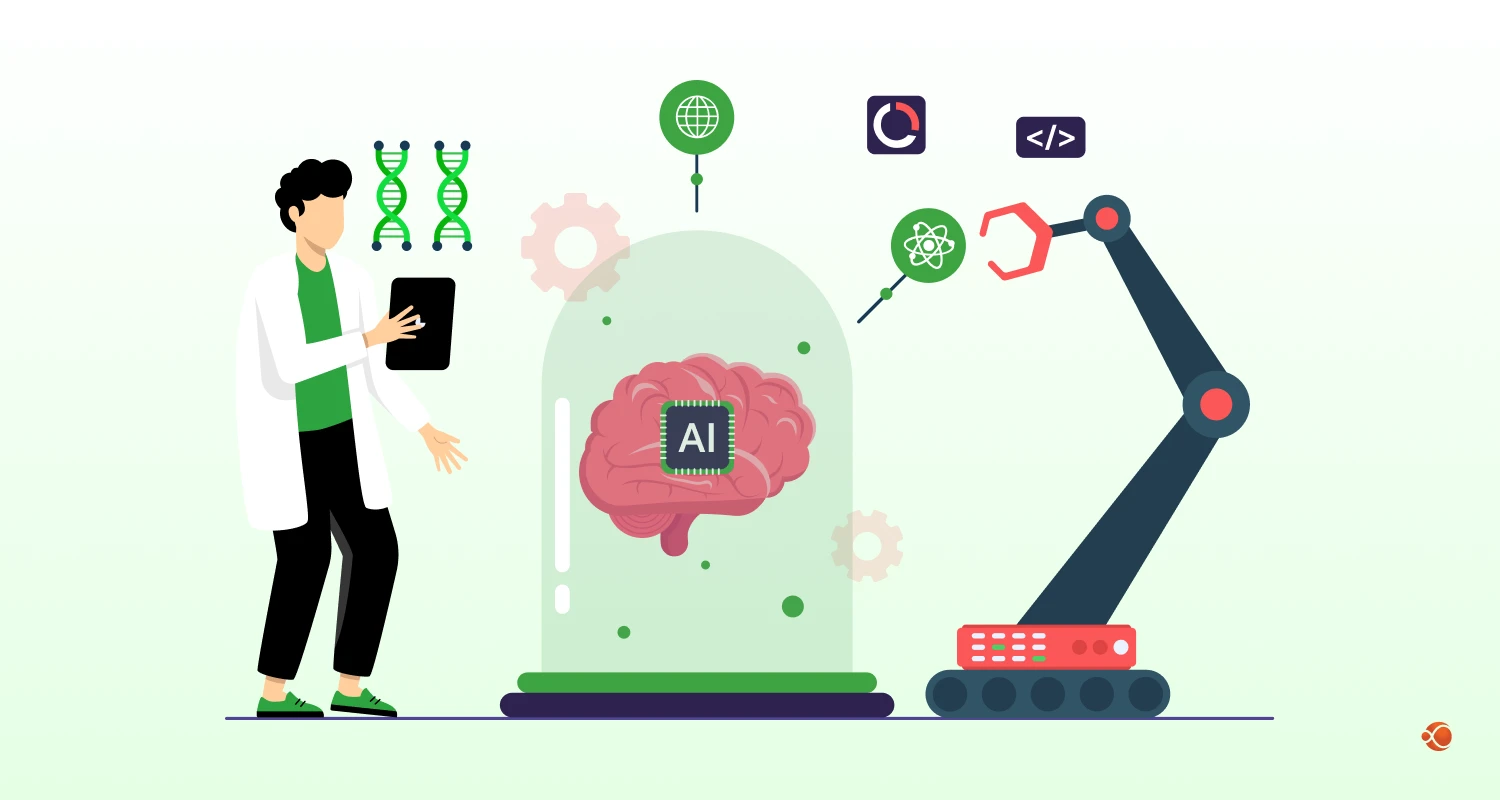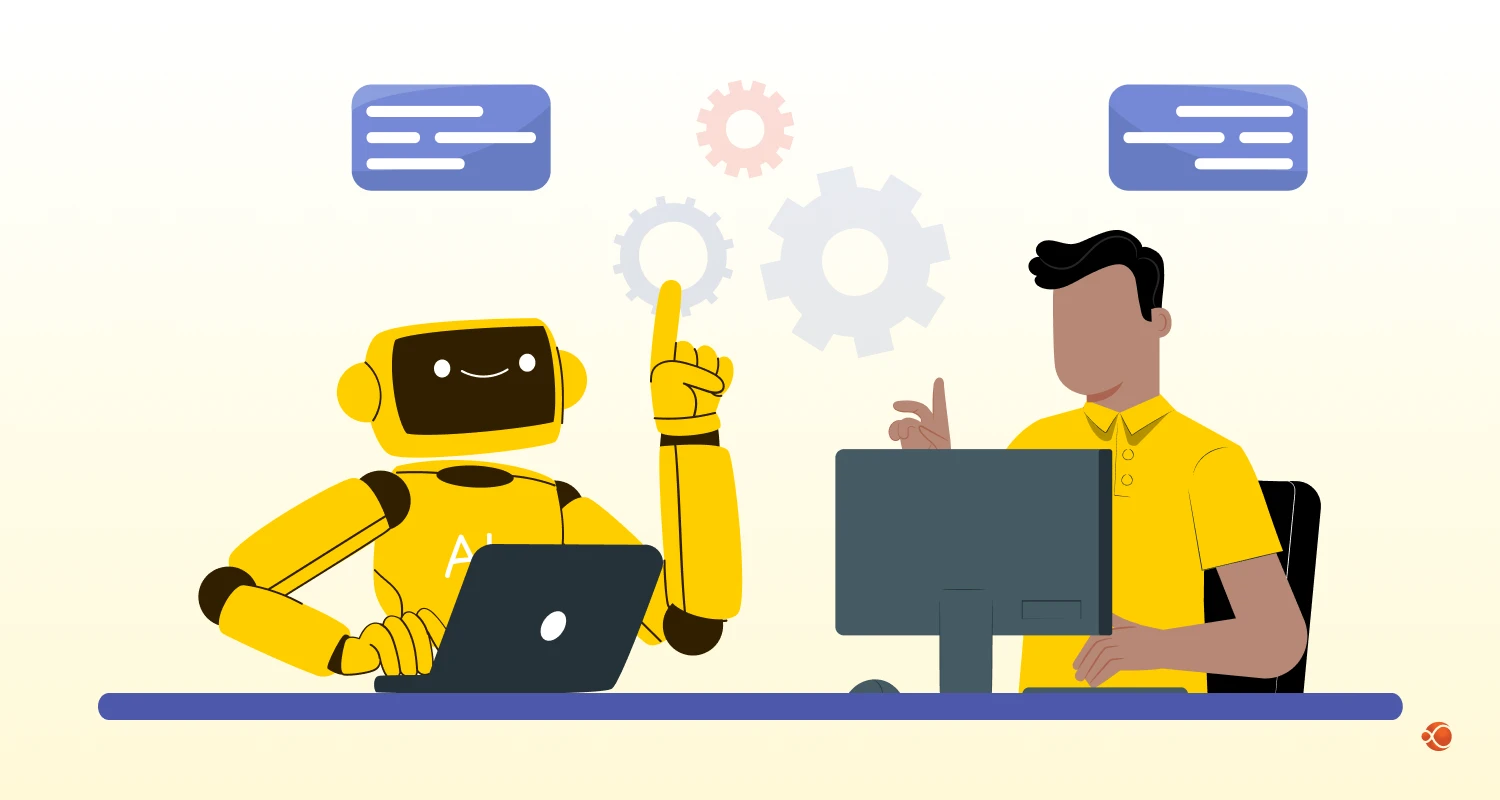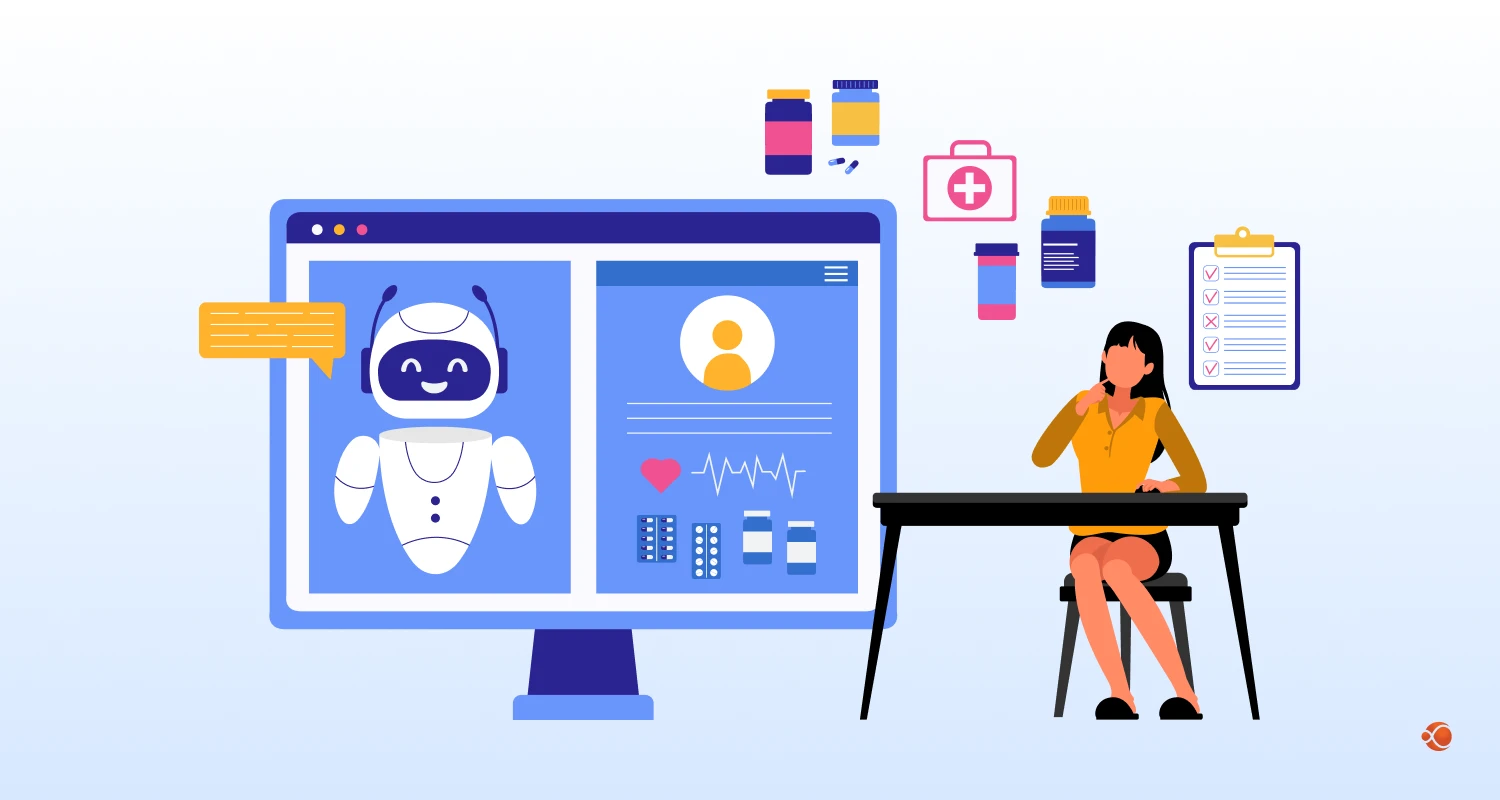The world has accepted, embraced and leveraged AI in almost every aspect of business processes, and day-to-day life. However, one of the core aspects of keeping any business afloat and smoothly running, doesn’t see the light and comfort of AI automation. We are talking about business processes and how most companies till date use manual processes, spreadsheets and other labour-intensive processes to keep track of every business aspect.
If you have been searching for ways to automate business processes or leverage AI to streamline your work, you have come to the right place. Today we are going to discuss what is an enterprise AI agent, what are the types of AI agents, and what it does for enterprise business processes with other important details.
Let’s get started by breaking down the concept of AI agents and their relevance:
What are Enterprise AI Agents?
You must have heard the big names in the tech space talking about enterprise AI agents, with Google bringing AI agents to enterprises with Vertex AI Agent Builder, IBM launching its AI agents and assistants for managing complex workflows and more. So what exactly is this new buzzword and why does it matter to you?
Enterprise AI agents or any AI agent are autonomous software programs that can perceive the environment, make decisions, and perform actions to achieve the desired output/goals without human intervention post deployment. The market size for AI Agents including ready-to-deploy agents, build-your-own agents and other types, was valued at USD 3.7 Billion in 2023, and is estimated to grow to USD 103.6 billion by 2032.
The focus here is on “without human intervention” as these agents are not just another AI tool that helps humans do their job with more efficiency, it potentially replaces the need of a human, by acting as a “doer” rather than a “thinker”. It doesn’t just generate content or analyze data, it acts on behalf of the user to carry out a task from inception to completion.
Benefits of AI Agents in Enterprises
- Cost Reduction – Reduces operational expenses by automating labor-intensive tasks and reducing human resource requirements.
- 24/7 Operations – Enable continuous business processes without downtime, holidays, or shift changes for maximum productivity.
- Enhanced Accuracy – Removes chances of human error in data processing, calculation, and other repetitive tasks.
- Faster Decision Making – Is able to process vast amounts of data instantly to provide real-time insights and automated decision execution.
- Improved Customer Experience – Deliver instant responses, personalized interactions, and consistent service quality across all touchpoints.
- Scalability – Easily handle increased workloads without proportional increases in staffing or infrastructure costs.
- Data-Driven Insights – Analyze patterns and trends in real-time to identify opportunities and optimize business strategies.
- Risk Mitigation – Continuously monitor for compliance violations, security threats, and operational anomalies with immediate alerts.
- Resource Optimization – Allocate human talent to high-value strategic work while agents handle routine operational tasks.
What makes Enterprise Automation with AI valuable?
Autonomy
AI agents can work independently once they are set up with the right protocols and configurations. For instance, if you are building an enterprise AI agent for customer support, it won’t just reactively address customer queries, it will reply to the user, solve their issue, and escalate it whenever needed.
Multi-Layered Reasoning and Action
AI agents for enterprise can carry out a series of tasks and functions to achieve the desired goal and not just stop at a single command. Any AI sales agent will be able to identify leads, send outreach emails, take follow-ups, and book meetings without any human interference.
Environment Awareness
AI agents are able to understand and adapt to the environment they operate in. With all the APIs, databases and third party tools, they know what needs to be done to ensure maximum efficiency. If you build an inventory agent it will check stock levels and automatically request reorders of the replenished products based on the set thresholds.
Learning and Adapting
Modern AI agents fine-tune their behaviour over time using feedback loops, not just scripts and rules. They are receptive to change and know how to survive in different environments. For instance, any AI trading agent can change its investment strategy after realising any difference in market trends.
How AI Agents for Enterprise Work
Understanding the mechanics behind enterprise AI solutions helps organizations better leverage their capabilities. AI agents operate through a sophisticated cycle of perception, planning, and execution that mirrors human problem-solving approaches.
When presented with a task or query, AI agent for enterprises follow a structured approach.
Perception and Analysis Phase
The agent starts the task by perceiving and analyzing the request, identifying that it needs sales data, comparative analysis capabilities, and access to historical records. It evaluates available tools and resources, which might include CRM systems, analytics platforms, and market research databases.
Planning and Strategy Phase
Next in the enterprise app development services process, comes the planning phase, where the agent creates a step-by-step execution strategy. It might plan to query the CRM for current quarter data, retrieve last year’s comparable figures, perform statistical analysis, and identify external market factors that influenced performance.
Execution and Response Phase
Finally, the execution phase involves the agent systematically carrying out its plan, calling necessary APIs, processing data, performing calculations, and synthesizing findings into a comprehensive response.
Types of AI Agents in Enterprise Applications
| Agent Type | Environment Awareness | Goal-Oriented | Learns & Adapts | Example Use Case |
| Simple Reflex | Low | No | No | Thermostat |
| Model-Based Reflex | Medium | No | No | Inventory Tracking |
| Goal-Based | Medium | Yes | No | Route Planning |
| Utility-Based | High | Yes | No | Automated Trading |
| Learning Agent | High | Yes | Yes | Fraud Detection System |
Simple Reflex Agents
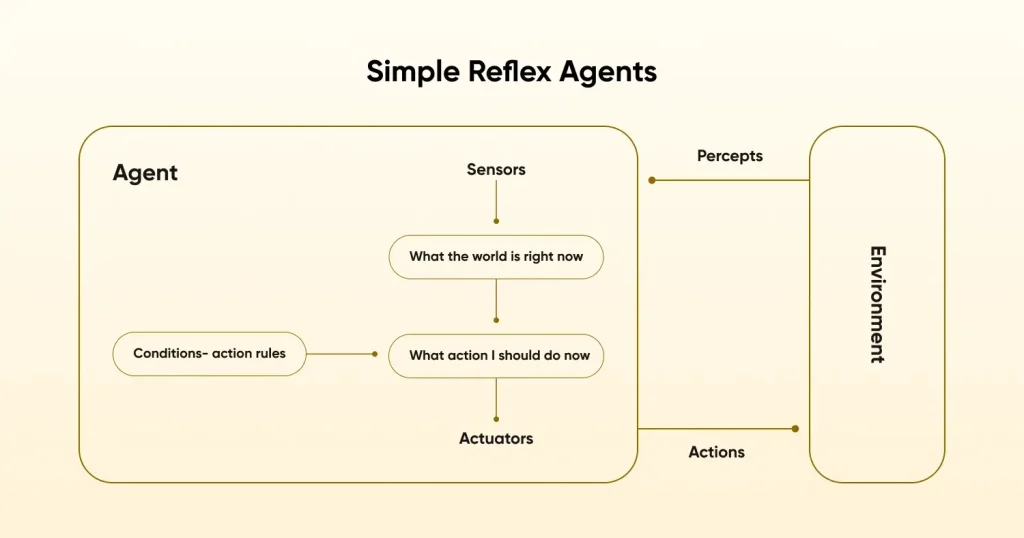
These agents operate based on condition-action rules and respond to current perceptions without considering history or future consequences. They follow “if-then” logic and are suitable for well-defined, predictable environments. Simple reflex agents are commonly used in basic automation tasks like thermostats, simple chatbots, and rule-based email filters.
Characteristics:
- React only to current state/input
- Use predefined condition-action rules
- No learning or memory capabilities
- Fast and efficient for simple tasks
Model-Based Reflex Agents
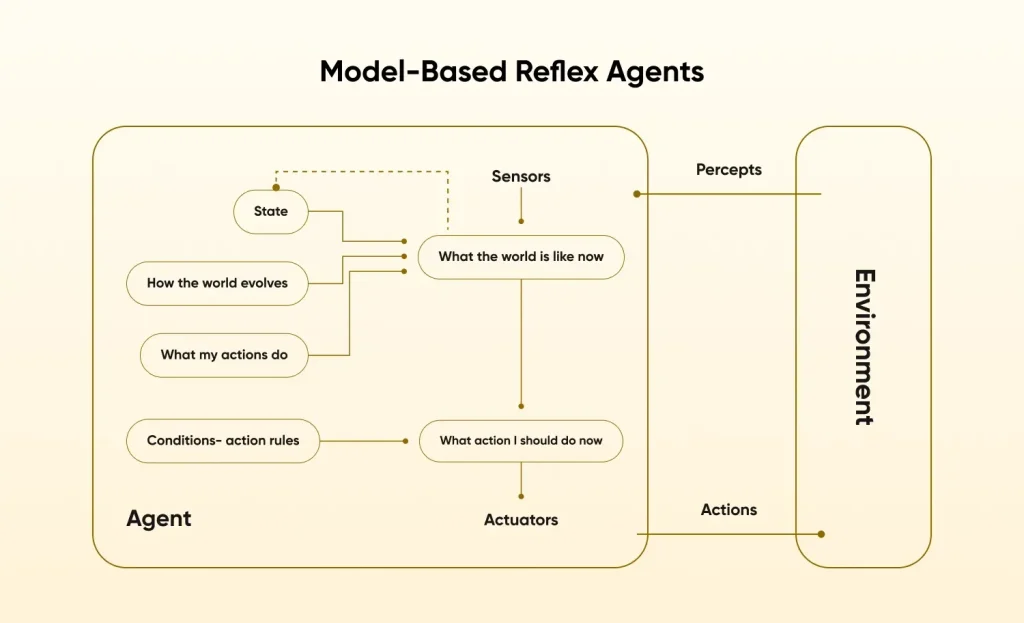
These AI agents have an internal model of the overall world and use it to handle partially observable environments. They keep track of aspects of the environment that are not currently visible and use this information to make better decisions. These agents are used in navigation systems, inventory management, and process monitoring applications.
Characteristics:
- Maintain internal state and world model
- Handle partially observable environments
- Use history to inform current decisions
- More robust than simple reflex agents
Goal-Based Agents
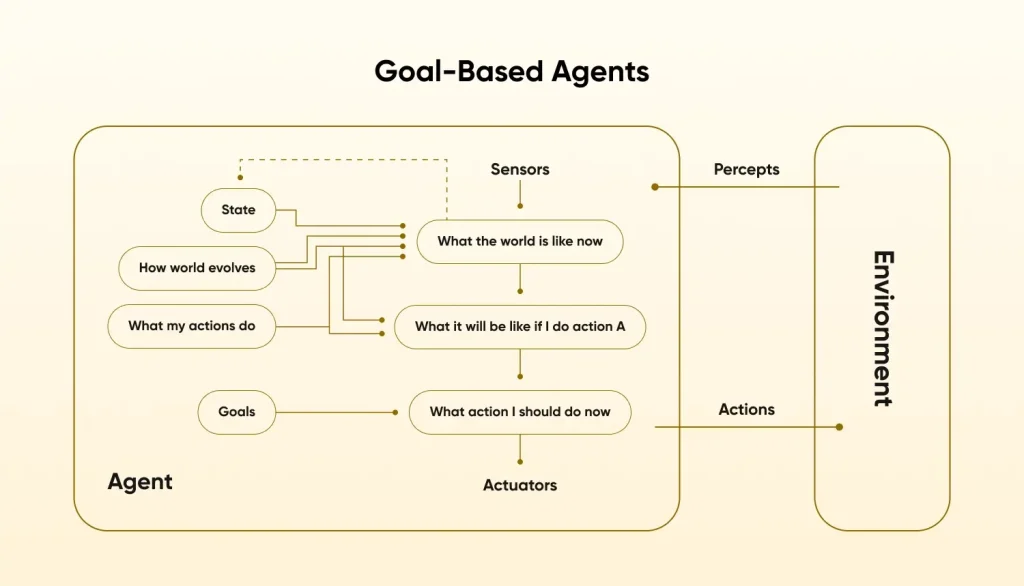
Goal-based agents are designed to work with a clear objective in mind. They don’t just react to the environment; they carefully plan a series of actions to achieve a specific outcome.
These kinds of AI agents analyze all possible action paths, and finalize the one that provides the best chance at achieving the desired result. They are used in project management software, automated planning tools, and in strategy-based games like Chess where each move matters.
Key Characteristics:
- Have well-defined goals and objectives
- Plan multiple steps to accomplish tasks
- Evaluate different options to find the best path to success
- Can change strategies if the situation demands it
Utility-Based Agents
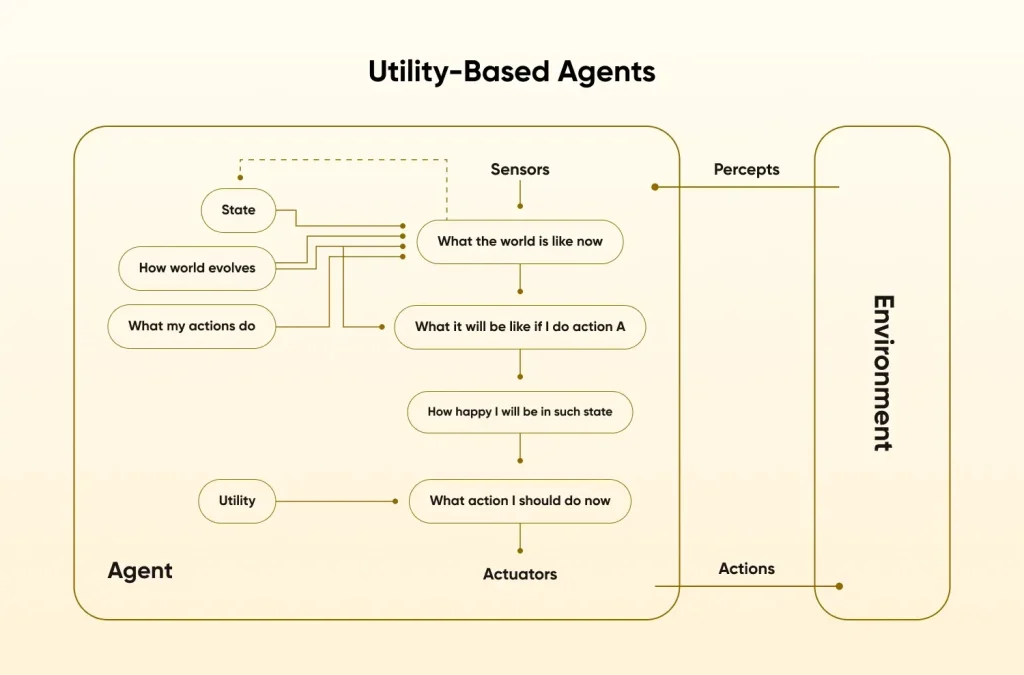
Unlike goal-based agents that focus on reaching a single objective, utility-based agents are built to make the smartest possible decision in situations where there are many possible outcomes. They rely on a utility function to figure out how useful or valuable each option is, helping them carefully balance trade-offs and conflicting priorities. You’ll find these agents behind the scenes in recommendation systems, financial trading platforms, and resource optimization tools anywhere that making the right choice truly matters.
Key Characteristics:
- Strive to maximize overall value or utility
- Can handle conflicting goals and prioritize tasks accordingly
- Make smart trade-offs based on set preferences
- Deliver decisions that are measurable and performance-driven
Learning Agents
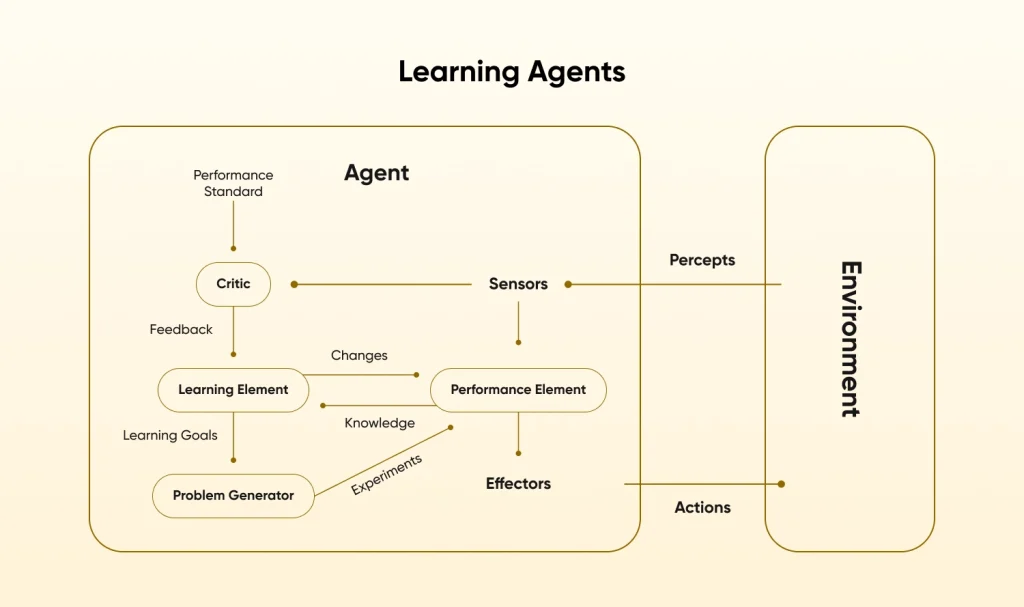
Learning agents take things a step further by not just following fixed rules they actually improve over time. They learn from experience, feedback, and changes in their environment, these agents continually sharpen their decision-making abilities. Whether it’s tailoring your app experience, spotting new fraud patterns, or adjusting to evolving user behavior, learning agents become smarter and more effective the longer they’re in action.
Key Characteristics:
- Continuously improve through learning and experience
- Easily adapt to new or unexpected situations
- Learn from successes, mistakes, and user feedback
- Update their knowledge and decision-making models over time

Enterprise AI Agents Use Cases in Business Processes
Customer Service & Support
Intelligent Virtual Assistants
Customer service AI agents provide routine inquiries across multiple channels while maintaining context throughout interactions. These agents can access customer history, product databases, and company policies to provide accurate responses. They seamlessly escalate complex issues to human agents with complete conversation history and relevant customer data.
Key tasks:
- Process customer inquiries via chat, email, and voice channels
- Resolve account-related questions and basic troubleshooting
- Schedule appointments and manage service requests
- Provide product information and troubleshooting guidance
Sales & Marketing
Lead Qualification Agents
Sales AI agents help sales teams by analyzing how prospects behave, who they are, and how they interact with your business. These enterprise sales AI agents can automatically score and prioritize leads.
They approach potential customers with personalized messages and handle the interaction until the prospect is ready to connect with a human sales representative. Throughout the process, they keep detailed records of every interaction and note customer preferences.
Key tasks:
- Score leads using behavioral and demographic information
- Send personalized follow-up emails and messages
- Schedule sales meetings and product demos
- Update CRM systems with all interaction data
Content Generation Agents
Marketing AI tools make it easier to create personalized content while keeping the brand’s unique voice intact. They study audience behavior, keep track of campaign performance, and identify market trends. These tools also fine-tune content based on where customers are in their buying journey and what they care about most.
Key tasks:
- Streamline email campaigns and social media posts
- Create product descriptions and marketing copy
- Develop A/B test variations for campaigns
- Produce blog articles and whitepapers
Finance & Accounting
Invoice Processing Agents
Finance AI agents automate accounts payable processes by extracting data from invoices, receipts, and purchase orders using OCR and NLP. They match documents across systems, identify discrepancies, and route approvals through proper workflows. These agents maintain audit trails and compliance documentation throughout the process.
Key tasks:
- Extract data from invoices and receipts using OCR
- Match invoices with purchase orders and delivery confirmations
- Route documents through approval workflows
- Generate payment recommendations and schedules
Financial Analysis Agents
Financial AI agents help companies keep track of their financial health by automatically watching important numbers and trends. They can quickly look through huge doses of data from different sources and turn it into easy-to-understand insights. These agents spot market trends, unusual patterns, and new opportunities that might otherwise be left out.
Key tasks:
- Monitor important financial numbers (KPIs) and create financial reports automatically.
- Find patterns in spending and suggest ways to save money.
- Check differences between planned and actual budgets, helping teams stay on track.
- Create forecasts and predictions about future financial performance
Human Resources
Recruitment Agents
HR AI agents work like your most organized recruiter, instantly screening resumes and ranking candidates by how well they fit your requirements. Instead of manually filtering through hundreds of applications, these digital assistants handle task-resource tasks.
They can even chat with candidates, ask important screening questions, and handle interview scheduling so you don’t have to deal with endless back-and-forth emails trying to schedule a time that works for all. Throughout the process, they keep proper records and track important hiring metrics, giving you a clear picture of what’s working in your recruitment process.
Key tasks:
- Screen resumes and rank candidates automatically
- Conduct initial candidate assessments via chatbots
- Schedule interviews and coordinate hiring workflows
- Generate offer letters and employment documentation
Employee Support Agents
Beyond hiring, AI agents transform daily HR interactions. Instead of digging through handbooks or waiting for email responses, employees get instant answers about policies and benefits through simple conversations.
These digital assistants handle routine tasks that usually overwhelm HR – time-off approvals, benefits enrollment, and procedure explanations. They’re available 24/7, so no waiting for business hours.
Key tasks:
- Answer HR policy and benefits questions
- Process leave requests and time-off approvals
- Handle benefits enrollment and changes
- Conduct exit interviews and gather feedback
Supply Chain & Operations
Inventory Management Agents
Inventory AI agents work like having a supply chain genius who never takes a break. They constantly analyze demand patterns, supplier reliability, and market shifts to keep you stocked just right – not too much, not too little.
These digital managers automatically trigger purchase orders when supplies run low and adjust forecasts when they spot seasonal changes or promotional surges.
Key tasks:
- Predict demand and optimize stock levels across different locations by analyzing sales data, seasonal trends, and supplier lead times. This helps prevent both overstocking and running out of stock.
- Automatically generate purchase orders and set reorder points based on real-time inventory data and predicted demand, reducing manual work and mistakes.
- Monitor supplier performance and delivery schedules, ensuring that orders arrive on time and identifying any issues early.
- Coordinate inventory transfers between warehouses, keeping stock balanced and available where it’s needed most.
Quality Control Agents
Manufacturing AI agents act like having quality inspectors with superhuman vision working every shift. They use sensors and computer vision to constantly watch your production lines, catching defects and process variations the moment they happen.
When something goes wrong, these agents don’t just flag the problem – they immediately trigger corrective actions and send alerts to the right people. They also keep meticulous records of everything, automatically generating the compliance reports that regulators require.
Key tasks:
- Monitor production quality using computer vision and sensors
- Identify defects and process variations in real-time
- Trigger corrective actions and quality alerts
- Generate quality reports and compliance documentation
Research and Development
Patent Analysis Agents
R&D AI agents work like highly skilled research assistants for innovation teams. They search through massive patent databases and scientific articles to find existing inventions (prior art), spot potential risks of patent infringement, and gather intelligence on what competitors are doing. These agents can quickly analyze the entire patent landscape to highlight areas where there are few or no existing patents helping teams find new opportunities for innovation.
Key tasks:
- Search patent databases for prior art and competitive intelligence
- Identify potential patent infringement risks and opportunities
- Generate patent landscape reports and analyses
- Monitor competitor patent filing activities
Research Synthesis Agents
Scientific AI agents aggregate and analyze research papers, publications, and experimental data to identify trends and patterns in specific domains. They generate literature reviews, research summaries, and hypothesis suggestions based on comprehensive analysis of existing scientific values.
Key tasks:
- Summarize scientific literature and research papers
- Identify trends and patterns across research domains
- Generate comprehensive literature reviews and summaries
- Suggest research hypotheses and experimental approaches
Key Aspects to Look For when Selecting an AI Agent Platform
We understand the purpose, the different types and the multiple use cases of enterprise AI agent solutions and AI agent platforms. But, how can we know which AI agent platform will be the most ideal one for us?
We have curated a list of things to look out for when considering any AI agent builder/platform:
Integration Capabilities
Ensure the platform smoothly integrates with your existing enterprise systems including CRM, ERP, databases, and APIs. Look for pre-built connectors and flexible API support that minimizes custom development requirements. The platform should work harmoniously with your current tech stack and essential business products.
Security and Compliance
Find enterprise-grade security features including encryption, secure APIs, and data residency options. The platform must meet industry-specific compliance requirements like GDPR, HIPAA, or SOX. Robust authentication, role-based permissions, and comprehensive audit trails are essential for monitoring agent activities.
Performance and Scalability
The platform should handle increasing workloads without degrading performance through cloud-native architecture that scales automatically. Verify it can support multiple agents and concurrent users simultaneously while maintaining optimal response times.
Ease of Use and Deployment
Prioritize platforms with low-code or no-code interfaces that allow business users to create agents without extensive technical expertise. Pre-built templates for common use cases accelerate implementation timelines. Flexible deployment options include cloud, on-premises, or hybrid environments should match your IT strategy.
Customization and Flexibility
The platform should offer visual workflow builders for mapping complex business processes and support custom business rules. Multi-modal capabilities handling text, voice, and visual inputs ensure comprehensive interaction scenarios. This flexibility allows agents to adapt to unique organizational requirements and evolving business needs.
Monitoring and Analytics
Essential features include real-time performance dashboards showing agent success rates and user satisfaction metrics. Comprehensive logging and audit trails support compliance and troubleshooting requirements. Built-in analytics help understand usage patterns and identify optimization opportunities for continuous improvement.
Cost Structure and ROI
Look for transparent pricing models that align with your usage patterns and growth projections. Understand any hidden costs for premium features, scaling, or additional support services. The platform should provide ROI calculators and tools to help estimate business value and measurable returns.
Trial and Proof of Concept Capabilities
The platform should offer pilot programs or proof-of-concept opportunities before full commitment. Clear success metrics and decision-making frameworks for scaling help validate effectiveness in your specific environment. This approach reduces risk and ensures the platform meets your actual business requirements.
Large Language Model (LLM) Support
The platform should support multiple LLM options including GPT, Claude, Gemini, and open-source alternatives for flexibility. You can also create AI agents using GPT. Look for fine-tuning capabilities for domain-specific tasks and both cloud-based and on-premises deployment options. The ability to switch between models ensures optimization for performance, cost, and compliance requirements.
Getting Started With AI Agents with a Simple Framework
For organizations new to AI agents, consider this phased approach:
Phase 1: Assessment and Planning (4-6 weeks)
- Identify high-volume, repetitive processes suitable for automation
- Evaluate current technology infrastructure and integration requirements
- Define success metrics and ROI expectations
- Select initial use case with clear business value and manageable complexity
Phase 2: Pilot Implementation (8-12 weeks)
- Choose an AI agent platform that aligns with your requirements
- Develop and deploy a proof-of-concept for your selected use case
- Conduct thorough testing with a limited user group
- Gather feedback and measure performance against defined metrics
Phase 3: Optimization and Scaling (12-16 weeks)
- Refine the AI agent based on pilot results and user feedback
- Expand to additional use cases or broader user groups
- Establish governance frameworks and monitoring processes
- Plan for organization-wide rollout and change management
Phase 4: Enterprise Deployment (Ongoing)
- Scale successful implementations across the organization
- Continuously monitor performance and optimize agent behavior
- Expand to more complex use cases as capabilities mature
- Develop internal expertise and best practices
Future Trends and AI Business Ideas for Enterprise AI Agents
1. Multi-Agent Orchestration Systems
The industry is moving toward “agentic AI” where multiple specialized agents collaborate seamlessly within sophisticated orchestration platforms. These systems enable agent-to-agent communication, dynamic task distribution, and emergent problem-solving through collaborative networks. Deloitte forecasts that 25% of enterprises using generative AI solutions will deploy AI Agents by 2025, growing to 50% by 2027, while complex challenges will be solved through coordinated agent teams rather than single-point solutions.
2. Autonomous Decision-Making Evolution
AI agents are evolving from reactive task executors to proactive strategic entities with enhanced reasoning capabilities. They will break down complex problems into logical sequences, maintain long-term contextual memory, and anticipate issues before they occur. Initially handling small, structured tasks with minimal financial impact, agents will gradually expand to more complex decision-making scenarios as enterprise confidence in their reliability grows. In such situations it is advisable to opt for AI consulting services that can help you create scalable AI agents from the ground up.
3. Industry-Specific Specialization
The future will see a shift from general-purpose agents toward hyper-specialized, domain-specific solutions tailored for particular industries. Hire ai developers that specialize in creating AI agents for different industries. Healthcare agents will integrate patient data with medical literature, financial agents will perform real-time market analysis, and manufacturing agents will optimize entire production lines. This vertical specialization represents a move toward groundbreaking advancements in key sectors rather than one-size-fits-all approaches.
4. Human-AI Collaborative Workflows
The next generation of AI agents will focus on smoothening human-AI collaboration rather than complete automation, creating hybrid workflows where agents handle routine tasks while humans focus on strategic oversight. These systems will feature intuitive interfaces, transparent decision-making processes, and the ability to explain their reasoning to human collaborators. The focus will be on augmenting human capabilities and creating symbiotic relationships that benefit from the strengths of both humans and AI agents.
Final Words
Enterprise AI agents represent a transformative shift from traditional automation to autonomous systems that perceive, reason, and act independently. Such agents offer unprecedented opportunities to streamline operations across various fields like customer service, finance, HR, and supply chain functions. For successful AI agent implementation, teams need to be careful about the integration capabilities, security, and phased implementation approaches. Organizations adopting AI agents today will be best positioned to capitalize on emerging multi-agent systems, autonomous decision-making, and human-AI collaborative workflows that define the future of business automation.
Build smarter enterprises with AI by leveraging CMARIX AI software development services.
Inquire Now!FAQs on Enterprise AI Agents
How AI Agents Transform Business Processes?
AI agents take over repetitive, rule-based tasks and make autonomous decisions based on data analysis. They create intelligent workflows that adapt to changing conditions, reducing human intervention while maintaining accuracy and consistency. These digital workers operate 24/7, processing information at scale and enabling businesses to respond faster to market demands.
Can AI Agents be Integrated with Existing Enterprise Systems
Professional AI agents seamlessly integrate with existing enterprise systems through APIs, middleware platforms, and cloud-based orchestration tools. They can connect to CRM systems, ERP platforms, databases, and legacy applications without requiring complete infrastructure overhauls. Modern AI agents are designed with enterprise-grade security and compliance features, making integration both practical and secure.
What Business Processes Can AI Agents Automate
AI agents are proficient at automating customer service interactions, data entry and processing, invoice management, and inventory optimization tasks. They handle complicated workflows like lead qualification, appointment scheduling, document review, and regulatory compliance monitoring. Financial processes such as expense reporting, fraud detection, and risk assessment are increasingly managed by intelligent agents.
What Are the Benefits of Using AI Agents in Business
AI agents dramatically reduce operational costs while improving accuracy and speed of business processes across departments. They free human employees from mundane tasks, allowing them to focus on strategic, creative, and relationship-building activities. Organizations see improved customer satisfaction through faster response times and consistent service quality.
How Are AI Agents Transforming Enterprise Operations?
AI agents are building autonomous business units that can make decisions, execute transactions. They also optimize operations without constant human oversight. They proivde predictive maintenance, dynamic pricing strategies, and real-time supply chain adjustments that were previously impossible. Enterprises are evolving into hybrid organizations where human creativity combines with AI efficiency to drive unprecedented growth and innovation.





